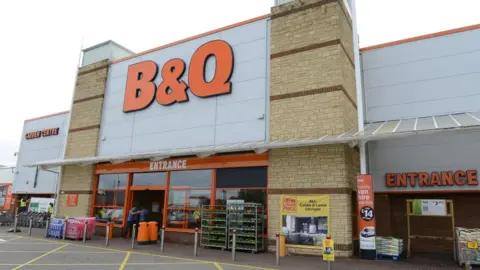B&Q in payouts over bad paint smells
 Kingfisher
KingfisherB&Q says it will compensate hundreds of people who experienced bad smells after painting their homes with Valspar paint that it sold them.
Customers have likened the smell to cat urine and rotten animals. They say the smell gets stronger in hot weather and if the windows are open.
Valspar says the problem is caused by an additive being removed from some of its paint. It has now re-added it.
Valspar and B&Q say they will pay for the cost of redecoration.
Charlotte Quine from Brighton recently redecorated her spare room using Valspar paint. She told Radio 4's You and Yours it took her a long time to figure out what was making the smell.
She said: "I assumed a cat must have got into the room through the window and sprayed everywhere. Eventually I moved all the furniture out, washed down all the walls, got some carpet cleaner, but again nothing."
Sniffed the walls
Ms Quine later saw messages left by other Valspar customers on the company's Facebook page complaining that the paint smelt bad. She sniffed her walls and realised where the smell was coming from.
Ms Quine complained and Valspar offered to cover the cost of new tins of paint. Their suggestion to fix the problem was to paint the walls with an alkaline-based sealant, and then reapply the paint, but she was worried that it would just mask the problem.
She said: "What concerns me is it seems that this problem is caused by bacteria growing in the paint and emitting the smell, and until Valspar are prepared to investigate, I am slightly concerned about just painting over it."
Graham Hill is managing director of ECHA Microbiology in Cardiff. He says the problem is likely to be caused by bacterial contamination in the can.
He said: "It's a well known issue in the paint industry. The bacteria grow in the can and release hydrogen sulphide gas which is the bad egg small, and ammonia which is the urine smell."
Bacterial growth
Mr Hill also suggested that changes in EU law, which restricts the types of preservatives that paint manufacturers can use, mean this problem is becoming more common.
"There's tighter and tighter restrictions on what preservatives we can use," he said. "We've taken solvents out of paints and this does make them more susceptible to bacterial growth. Alkali [sealant] should break down hydrogen sulphide, so it shouldn't smell as much."
Valspar said: "The ammonia-type odour occurs very rarely and when used on walls that are particularly porous, and where the wall is exposed to excessive heat or direct sunlight. The odour naturally wears off over time."
B&Q says anyone affected should ring their customer service helpline on 0333 014 3098.
